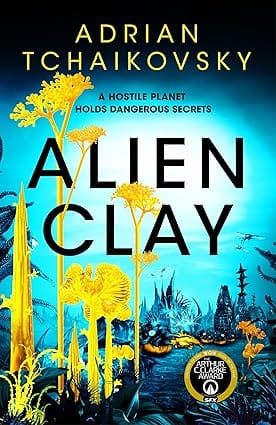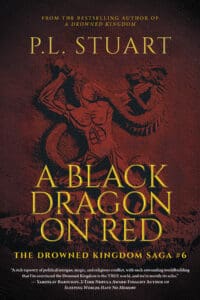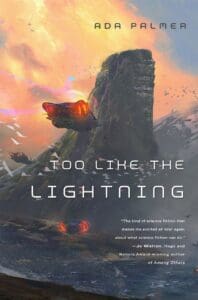
Synopsis
Alien Clay is a thrilling far-future adventure by acclaimed Arthur C. Clarke Award-winning author Adrian Tchaikovsky.
The planet of Kiln is where the tyrannical Mandate keeps its prison colony, and for inmates the journey there is always a one-way trip. One such prisoner is Professor Arton Daghdev, xeno-ecologist and political dissident. Soon after arrival he discovers that Kiln has a secret. Humanity is not the first intelligent life to set foot there.
In the midst a ravenous, chaotic ecosystem are the ruins of a civilization, but who were the vanished builders and where did they go? If he can survive both the harsh rule of the camp commandant and the alien horrors of the world around him, then Arton has a chance at making a discovery that might just transform not only Kiln but distant Earth as well.
Review
My thanks to NetGalley and the publishers, Tor (Pan Macmillan), for providing me with the eARC.
Because it can’t be hell without fellow sinners to suffer amongst.
Alien Clay provides further evidence of Adrian Tchaikovsky’s unparalleled and unfathomable imagination. A master storyteller and world builder, Tchaikovsky delivers yet another fascinating speculative vision of an alien ecology, that is both innovative and immersive.
The book takes place in a future where a dystopian Earth utilises alien planets as prison colonies, with the prisoners providing free and disposable labour. Enter Arton Daghdev, xeno-ecologist and political dissident, who is literally dropped onto planet Kiln with little hope of survival beyond his landing.
The first person narrative, solely from Daghdev’s perspective, lends to the mystery of the planet; through Daghdev’s journey, we learn about the planet, its inhabitants, the politics of the prison camp, and by association, that of Earth. This style and perspective works well, maintaining anticipation and intrigue throughout, which made this story a real page turner.
There are no spiders. There are worse things than spiders.
Life on Kiln is not as we know it. This is where the author’s imagination takes us on a trip of sheer mind-blowing ideas and spectacle. The nature of Kiln is mysterious and unusual to say the least. This is first contact with a difference – close encounters of a revolutionary kind.
The ecology of the planet is linked strongly with the themes of the book. The inhabitants of the planet are the metaphorical clay in the Kiln.
What links us to the world links us to each other.
The human story works in symbiosis with the planet’s nature, with strong themes of evolution and revolution. Whilst the Sardonic cynicism of Daghdev’s narrative adds to the dystopian feel, there is a distinct undercurrent of hope – that things can get better and worth fighting for. Empathy, evolving relationships, and philosophical musings of working together is better than working against one and other. The parallels between the revolutionary aspects of the human contingent and the evolutionary nature of the planet work very well together.
Despite some minor pacing issues, where I felt the story became a little bogged down in the middle third, I had a very enjoyable time with this story. The author, through the narrative style, leaves subtle hooks in each chapter that makes you want to continue to the next chapter. As a standalone novel it has a satisfying ending, leaving room for questions and speculation afterwards. The philosophical and metaphysical aspects provide food for thought on the impact of the themes explored in the story.
Overall, Alien Clay is a solid example of what speculative fiction should strive to be – imaginative, thoughtful, philosophical, and good fun too! A story that challenges the status quo, inviting the reader to think and to question.
Adrian Tchaikovsky quickly has become one of my favourite authors, and with Alien Clay he has delivered yet another reminder of why that is. So if you are looking for a standalone entry point to Tchaikovsky, then Alien Clay would be a very good place to start.
Alien Clay is due to be published on 28th March 2024.









Leave a Reply